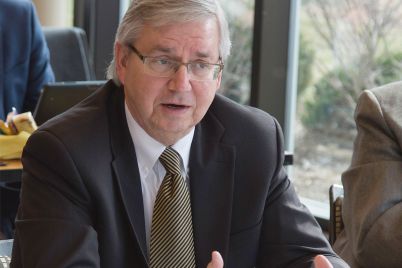
Gabriel Ehrlich (left) and Donald Grimes. Images courtesy of U-M
By Nicholas Ketchum
Deputy Editor
Economists from the University of Michigan’s Research Seminar in Quantitative Economics told the Washtenaw Economic Club they are not forecasting a recession in 2019.
Gabriel Ehrlich, director at RSQE, and Donald Grimes, regional economic specialist at RSQE, spoke during the April 28 luncheon at the Morris Lawrence Building on campus.
“We’re not forecasting a recession, and that’s very important to understand. This is basically as good as you can get, given how tight the labor market is in the county,” said Grimes, referencing a competitive job market in Washtenaw County.
Ehrlich suggested that people follow the actions and statements of the Federal Reserve for additional cues on the economy’s trajectory.
“One thing to keep your eye on is the Federal Reserve. The Fed is looking at the same data we are… they understand that people are getting worried, and that’s why… they’re saying we’re not going to be raising interest rates as much as we’ve thought to support growth,’” he said.
Despite the no-recession forecast, Ehrlich said RSQE is predicting growth will slow, in general.
“We’re expecting GDP growth to decelerate over the next few years,” he said. “We’re projecting real GDP growth to register a pretty disappointing 1.4 percent at an annual rate in the first quarter of 2019.”
Citing stateside employment statistics, Grimes said Michigan has nearly recovered to its pre-recession unemployment rate. Washtenaw County has long since recovered; in 2013 the county surpassed its pre-recession unemployment rate and has held strong.
“Even back then, we knew that Washtenaw County was sort of this special place and that we had no doubt that Washtenaw would exceed its previous peak, and of course it has,” Grimes said. “By the end of our forecast [in 2021], we’re forecasting that Washtenaw County will be 13 percent higher in terms of employment than it had been in 2000.”
However, job growth in Washtenaw County has slowed—and is still slowing—according to Grimes.
“We expect [job growth] to continue to slow down in 2019, to about 2100 jobs. That slow down reflects a tightening labor market, a slowing national economy, and continued below average growth in state government—which is basically driven by the University of Michigan and Eastern,” Grimes said.
Grimes said he expects job gains to reach about 1.1 percent through both 2020 and 2021 in Washtenaw County.
“It’s not gangbusters employment growth, which is what we were getting when we were coming out of a recession,” warned Grimes, though adding it’s “very respectable growth at this stage in the business cycle.”
Ehrlich noted Washtenaw County’s relatively low unemployment rate in previous years, compared to the statewide rate, might allow the county’s currently-low unemployment rate to descend even lower.
“We interpret that history as suggesting even though the unemployment rate is already low in Washtenaw County, it still has some room to [go lower],” said Ehrlich.


